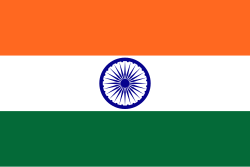| India at the 1982 Asian Games | |
|---|---|
 | |
| IOC code | IND |
| NOC | Indian Olympic Association |
| in New Delhi | |
| Medals Ranked 5th |
|
| Asian Games appearances (overview) | |
India was the host nation for the 1982 Asian Games held at Delhi, India from 19 November to 4 December 1982. Ranked 5th with 13 gold medals, 19 silver medals and 25 bronze medals with a total of 57 over-all medals. [1] [2] [3]